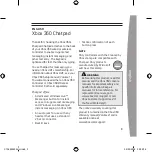
3
1.4 Before starting the test run
Caution:
• Turn on the main power switch of the outdoor unit more than 12 hours
before starting operation. Starting operation immediately after turning on
the power switch can severely damage the internal parts. Keep the main
power switch turned on during the operation period.
• In heating mode, to avoid the heat emitters being damaged by excessive
-
ly hot water, set the target flow temperature to a minimum of 2ºC below
the maximum allowable temperature of all the heat emitters. For Zone2,
set the target flow temperature to a minimum of 5ºC below the maximum
allowable flow temperature of all the heat emitters in Zone2 circuit.
• Before starting operation, check that all protective parts are correctly in
-
stalled. Make sure not to get injured by touching high voltage parts.
• Do not touch any switch with wet hands. There may be a risk to get an
electric shock.
• After stopping operation, make sure to wait at least 5 minutes before
turning off the main power. Otherwise, it may cause breakdown.
1.5 Electric booster and immersion heaters
Warning:
• FTC has signal outputs for heaters however it can not isolate power to
them in the event of overheating. All electrical heaters used on the water
circuit must have.
a) A thermostat to prevent overheating.
b) A non-self resetting thermal mechanism to prevent overheating.
Abbreviations and glossary
Abbreviations/Word
Description
Ambient temperature
The outdoor temperature
Freeze stat. function
Heating to prevent water pipes freezing
ASHP/HP
Air source heat pump
COP
Coefficient of performance the efficiency of the heat pump
Cylinder unit
Indoor unvented DHW tank and component plumbing parts
Hydrobox
Indoor unit housing the component plumbing parts (NO DHW tank)
DeltaT
Difference in temperature between two system locations.
DHW mode
Domestic hot water heating mode for showers, sinks, etc
Flow temperature
Temperature at which water is delivered to the primary circuit
FTC (Master)
Flow temperature controller, the circuit board in charge of controlling the system, master board for multiple outdoor units control
FTC (Slave)
Slave board for multiple outdoor units control
Compensation curve mode
Space heating incorporating outdoor temperature compensation
Heating mode
Space heating through radiators or under floor heating
Cooling mode
Space cooling through radiators or under floor cooling
Legionella
Bacteria potentially found in plumbing, showers and water tanks that may cause Legionnaires disease
LP mode
Legionella prevention mode – a function on systems with tanks to prevent the growth of legionella bacterium
Packaged model
Plate heat exchanger (Refrigerant - Water) in the outdoor heat pump unit
Split model
Plate heat exchanger (Refrigerant - Water) in the indoor unit
TRV
Thermostatic radiator valve – a valve on the entrance or exit of the radiator panel controlling the heat output
1. Safety precautions
2. Installing the FTC unit
2.1. Check the parts (Fig. 2.1.1)
The FTC unit should be supplied with the following parts.
Part name
Wiring
diagram
symbol
Q’ty
PAC-
IF061
PAC-
IF062
PAC-
IF063
PAC-
SIF051
1
FTC (master) unit/FTC (slave) unit
1
1
1
1
2
Liquid refrigerant temp. thermistor
(Lead wire: 5m/Red, Connector: 3p/Yellow)
TH2
1
─
─
1
3
Flow water temp. and Return water
temp. thermistor
(Lead wire: Gray (Flow water temp.),
Black(Return water temp.),
Connector: 4p/Red)
THW1/2
1
(5m/5m)
1
(5m/5m)
1
(1.1m/
1.2m)
1
(5m/5m)
4
Tank temp. thermistor
(Lead wire: 1.8m/Gray, connector: 2p/white)
THW5
─
─
1
─
5
Main remote controller cable (10 m)
1
1
1
1
6
Main remote controller
1
1
1
─
7
SD memory card
1
1
1
1
1
2
,
3
,
4
5
6
7
<Fig. 2.1.1>
Master
Slave
Summary of Contents for PAC-SIF051B-E
Page 69: ......




































